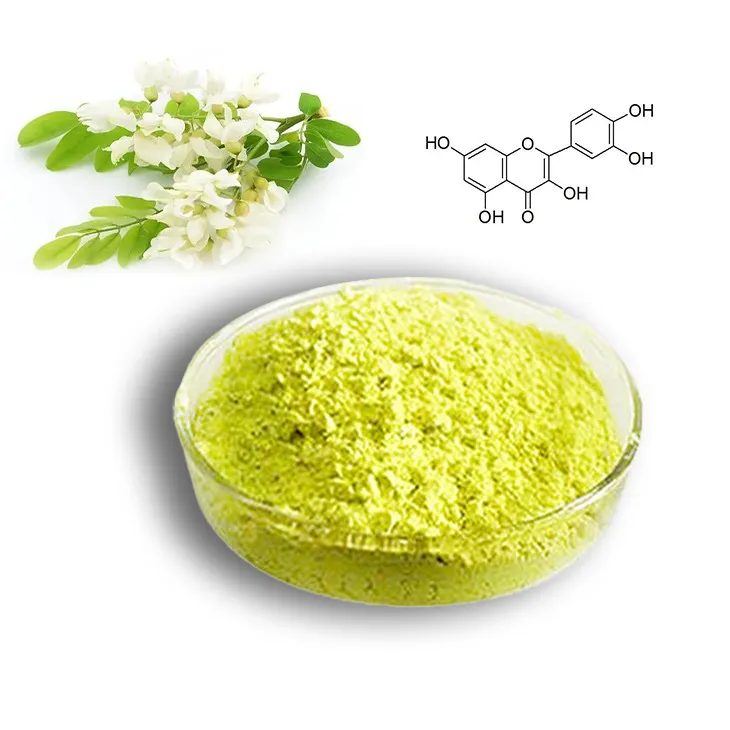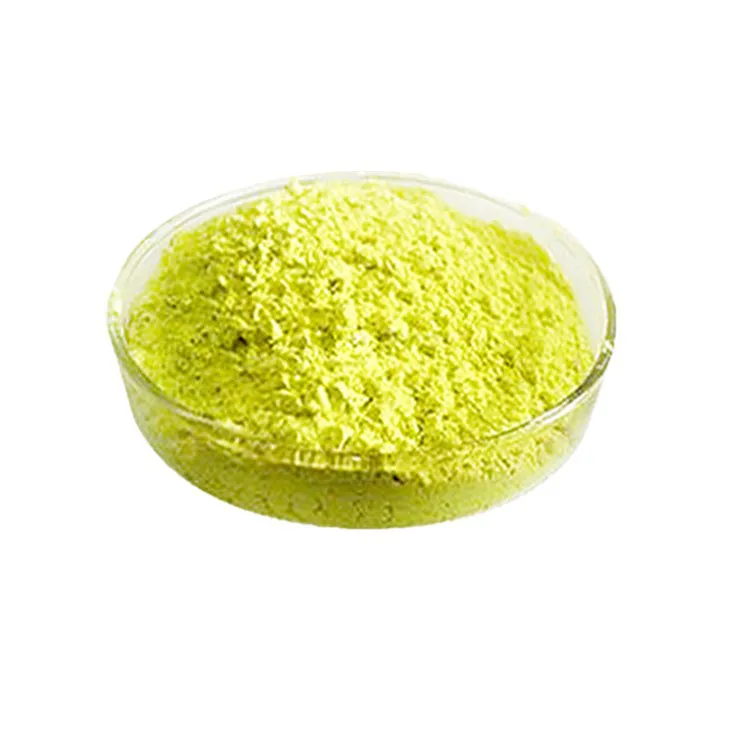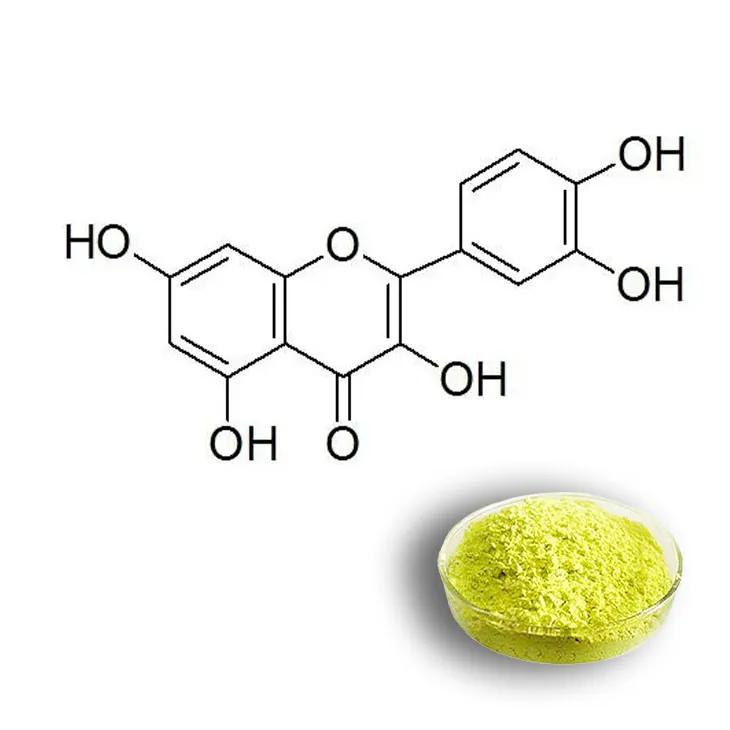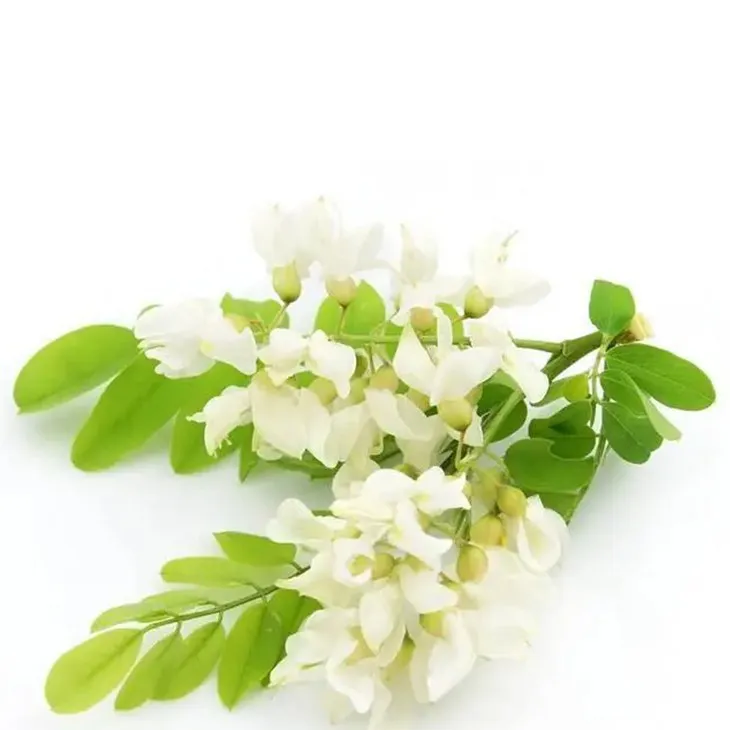- 0086-571-85302990
- sales@greenskybio.com
An ingredient for making skin glow - quercetin.
2024-11-12

Introduction
In the world of skincare, the search for effective ingredients is an ongoing pursuit. One such ingredient that has been garnering increasing attention is Quercetin. Quercetin is a flavonoid, a type of natural compound found in many plants. It is not only abundant in nature but also holds great potential in the realm of skincare.

Antioxidant Properties
One of the key features of Quercetin is its role as an antioxidant. Our skin is constantly under the threat of oxidative stress. This occurs due to various factors such as exposure to ultraviolet (UV) radiation from the sun, pollution, and certain lifestyle factors. Oxidative stress can lead to the production of free radicals within the skin cells.
These free radicals are highly reactive molecules that can cause significant damage to the skin. They can disrupt the normal function and structure of the skin cells. For instance, they can damage the DNA within the cells, which may lead to mutations and ultimately contribute to skin cancer development. They can also break down the proteins and lipids that are essential for maintaining the skin's integrity.
However, quercetin acts as a powerful shield against oxidative stress. It has the ability to scavenge free radicals. This means that it can neutralize these harmful molecules before they can cause damage. By doing so, quercetin helps in maintaining the normal function and structure of the skin.
This antioxidant activity of quercetin also plays a crucial role in preventing premature aging of the skin. As we age, the skin naturally loses its elasticity and firmness. This is partly due to the cumulative damage caused by free radicals over time. Quercetin helps to slow down this process by reducing the oxidative damage. It can help to keep the skin looking younger and more vibrant for a longer period.

Anti - Inflammatory Capacity
Another significant advantage of quercetin is its anti - inflammatory capacity. Inflammation in the skin can be triggered by a variety of factors. It could be due to an allergic reaction to a certain product, exposure to an irritant, or an underlying skin condition.
When the skin experiences an inflammatory response, it can lead to various problems. These can range from minor issues such as blemishes, like pimples and redness, to more serious skin disorders. For example, chronic inflammation can contribute to conditions like eczema, psoriasis, and dermatitis.
Quercetin can help to suppress this inflammation. It works by interfering with the inflammatory pathways within the skin cells. By reducing inflammation, quercetin promotes a more even - toned and healthy - looking skin. It can help to reduce redness, puffiness, and irritation, giving the skin a more balanced and pleasant appearance.

Enhancing Skin Barrier Function
The skin barrier is a vital component of healthy skin. A strong skin barrier serves multiple important functions. Firstly, it is crucial for retaining moisture. When the skin barrier is intact, it prevents water loss from the skin, keeping it hydrated. This is essential for maintaining the skin's softness, smoothness, and overall health.
Secondly, the skin barrier protects against external aggressors. These can include environmental pollutants, bacteria, viruses, and other harmful substances. A well - functioning skin barrier acts as a physical and chemical defense, preventing these invaders from penetrating the skin and causing damage.
Quercetin has the potential to contribute to strengthening this skin barrier. It can enhance the production of certain lipids and proteins that are key components of the skin barrier. By doing so, it makes the skin more resilient. A more resilient skin is better able to withstand the daily challenges it faces, such as exposure to harsh weather conditions or the use of skincare products that may otherwise cause irritation.
Additionally, as the skin barrier is strengthened, it becomes more effective at retaining moisture. This increased hydration gives the skin a natural glow. A well - hydrated skin reflects light better, giving it a healthy and radiant appearance.

Quercetin Sources and Incorporation in Skincare
Quercetin can be obtained from various natural sources. It is found in many fruits, vegetables, and herbs. For example, apples, onions, berries (such as blueberries and cranberries), and green tea are all rich sources of quercetin.
In the skincare industry, quercetin is increasingly being incorporated into various products. It can be found in creams, serums, and lotions. However, it is important to note that the effectiveness of these products may vary depending on factors such as the concentration of quercetin, the formulation of the product, and how it is applied.
When choosing skincare products containing quercetin, it is advisable to look for products from reliable brands. These brands are more likely to conduct proper research and quality control to ensure the efficacy and safety of their products.
Conclusion
In conclusion, quercetin is a remarkable ingredient with multiple benefits for the skin. Its antioxidant, anti - inflammatory, and skin barrier - enhancing properties make it a valuable addition to the world of skincare. Whether obtained through a healthy diet rich in quercetin - containing foods or through the use of skincare products, it has the potential to contribute to achieving that much - desired radiant and healthy skin. As research on quercetin continues to unfold, we can expect to learn even more about its potential applications in skincare and how it can be optimized for maximum benefit.
FAQ:
What is quercetin?
Quercetin is a flavonoid which has great potential in skincare.
How does quercetin help with skin?
Quercetin has antioxidant, anti - inflammatory properties and can enhance the skin's barrier function. Its antioxidant feature helps scavenge free radicals, preventing premature skin aging. The anti - inflammatory capacity promotes even - toned and healthy - looking skin. And enhancing the skin barrier makes the skin more resilient and hydrated, resulting in a natural glow.
Why is the antioxidant property of quercetin important for skin?
Skin is constantly exposed to oxidative stress. Quercetin's antioxidant property acts as a shield against it by scavenging free radicals that could disrupt the skin's normal function and structure, thus helping to prevent premature aging.
Can quercetin treat skin disorders?
While quercetin has anti - inflammatory capacity which can help with inflammatory responses in the skin that lead to various problems from blemishes to more serious skin disorders, it may not be a sole treatment. However, it can contribute to promoting a healthier skin state by suppressing inflammation.
How does quercetin enhance the skin's barrier function?
Quercetin can contribute to strengthening the skin barrier. A strong skin barrier is crucial for retaining moisture and protecting against external aggressors. By enhancing this barrier, quercetin makes the skin more resilient and hydrated, which gives the skin a natural glow.
Related literature
- The Role of Quercetin in Skin Health and Aging"
- "Quercetin: A Promising Ingredient for Skin Care"
- "Antioxidant Flavonoids like Quercetin in Skin Protection"
- ▶ Hesperidin
- ▶ citrus bioflavonoids
- ▶ plant extract
- ▶ lycopene
- ▶ Diosmin
- ▶ Grape seed extract
- ▶ Sea buckthorn Juice Powder
- ▶ Beetroot powder
- ▶ Hops Extract
- ▶ Artichoke Extract
- ▶ Reishi mushroom extract
- ▶ Astaxanthin
- ▶ Green Tea Extract
- ▶ Curcumin Extract
- ▶ Horse Chestnut Extract
- ▶ Other Problems
- ▶ Boswellia Serrata Extract
- ▶ Resveratrol Extract
- ▶ Marigold Extract
- ▶ Grape Leaf Extract
- ▶ blog3
-
Cranberry Plants and Skin - care Products.
2024-11-12
-
Beetroot juice Powder
2024-11-12
-
Eyebright Extract
2024-11-12
-
Elderberry Extract
2024-11-12
-
Red Vine Extract
2024-11-12
-
Lavender Extract
2024-11-12
-
Centella Asiatica Extract
2024-11-12
-
Berberis aristata Extract
2024-11-12
-
Shikone Extract
2024-11-12
-
Carrageenan Extract Powder
2024-11-12
-
Tamarind extract powder
2024-11-12





















